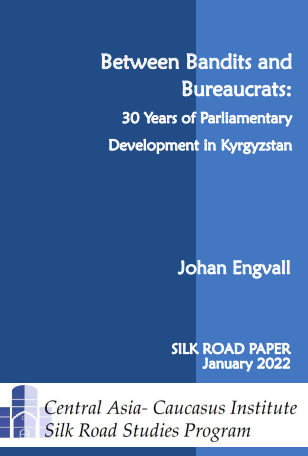Can Central Asia Seize the Initiative?
By S. Frederick Starr
October 30, 2022
https://nationalinterest.org/feature/can-central-asia-seize-initiative-205553

The meetings by heads of state in Issyk-Kul and Tashkent earlier this summer showed clearly that America’s abrupt departure from Afghanistan last year and its long-term neglect of Central Asia did not mark the end of history. Quite the contrary.
SINCE THEIR independence from the USSR, the five Central Asian states that emerged from the wreckage of the Soviet Union in 1991 have been the object of great power dreams. Russia, with steady persistence, has tried to lure them back into its sphere of influence, if not of direct control, through economic and security alliances. The United States and Europe have worked to develop them as market economies, and to implant civil society and democratic institutions there. Meanwhile, China assigned them key roles in its Belt and Road Initiative and loaned them billions to develop economic strengths that complement Beijing’s own. Applying Julius Caesar’s classic divide et impera maxim, all these major powers have offered rewards for cooperation and withheld them from the recalcitrant. As a result, the Central Asians risked becoming mere objects of great power maneuvers and not subjects in their own right.
This summer, the Central Asians themselves took two steps to overcome this fate. First, on July 21 the presidents of Kazakhstan, the Kyrgyz Republic, Tajikistan, Turkmenistan, and Uzbekistan, meeting at Issyk-Kul in the Kyrgyz Republic, signed a far-ranging agreement to coordinate their efforts by forging a web of institutional links. These cover areas as diverse as trade, economics, social policy, ecology, medical research, and security. Such a regional consultative structure is urgently needed. Until now, Central Asia has been the only major world region that does not have its own web of institutional ties, i.e., a structure for formulating common policies and organizations capable of implementing them. This left the region at the mercy of major powers and of neighboring states, all of which have proven adept at playing Central Asians off against each other.
Furthermore, on July 26 the same regional states, supported by senior officials from several dozen other countries worldwide, including the United States, Russia, India, the European Union, and China, convened in Uzbekistan’s capital, Tashkent, for the purpose of expanding contacts with the new government in Kabul. Their immediate goals were to eliminate threats from extremist bands operating from Afghan territory and to identify changes in Taliban policies that would open the door to broader interaction between Afghanistan, its Central Asian neighbors, and the world. These meetings covered areas as diverse as information, finance, and women’s and minority rights. Their longer-term objective was to improve relations to the point that the Central Asians could open direct transport corridors through Afghanistan to Pakistan, India, Southeast Asia, and Iran.
Whether these two ambitious initiatives will succeed is an open question. Their very existence, however, reflects the Central Asians’ determination to shape their own destiny and to emerge as a world region with linking institutions comparable to the Association of Southeast Asian Nations (ASEAN), the Baltic Council, or other regional bodies worldwide.
WHY, THREE decades after gaining independence, have the Central Asian states suddenly focused on linking arms and collaborating? Three very different developments gave rise to this important movement. First, the unplanned and abrupt American withdrawal from Afghanistan left the Central Asian countries facing a chaotic and potentially dangerous neighbor to the south. Besides threatening a rise of instability across the region, the tumult in Afghanistan extinguished the hope of opening southward trade routes that would give the Central Asians direct access to the Indian subcontinent and the booming economies of Southeast Asia. The importance of that potential “door to the south” cannot be overestimated. Without it, all Central Asia would be left under Russia’s economic and political thumb and unable to constrain China’s economic incursions. Only with such a corridor to South Asia would these countries be able to affirm their own sovereignty and independence while at the same time establishing balanced and constructive relations with all the major political and economic powers.
Second, Russia’s unprovoked invasion of Ukraine sent a shock wave across all Central Asia, not least because, like Ukraine, all the states in that region had only recently freed themselves from Russian rule and now feared that Moscow was trying to impose it anew. This was no mere paranoia on the part of the new sovereignties. Had Vladimir Putin not compared himself to Peter the Great, who expanded Russia’s territory by conquering neighbors? Had Dmitry Medvedev, head of Russia’s Security Council and former Russian president, not announced that the attack on Ukraine was but the first step towards reassembling all the lands that had formerly been part of the Soviet Union? Central Asians had already established contacts with the West, but those links did not suffice to enable them to counterbalance pressures from the north and east. The obvious next step was to create new economic and political links with South and Southeast Asia. But this requires reopening links of communication and trade that have lain dormant since the rise of the Soviet Union.
The third factor that gave rise to the new spirit of regional vitality on display at Issyk-Kul and Tashkent was the rise of Shavkat Mirziyoyev as president of Uzbekistan. His predecessor, Islam Karimov, had solidified Uzbekistan’s independence by walling the country off from its neighbors, including the other four Central Asian states and Afghanistan. Uzbekistan advanced, but at the price of the resentment of its regional neighbors and the hostility of the West, which condemned its heavy-handed treatment of its own population. Mirziyoyev, Karimov’s former prime minister, brought a sharp change of course after his election in 2016. In a series of dramatic moves, he instituted legal reforms, set about developing a market economy, and loosened many long-standing controls on the Uzbek populace. Most important, he declared peace with all Uzbekistan’s neighbors, opened cross-border contacts and trade, and began systematically reaching out to the other Central Asian states. By so doing, he launched the movement that bore fruit in Issyk-Kul and Tashkent.
What was actually accomplished in the region-wide protocol—formally known as the “Agreement on Friendship, Neighborliness, and Cooperation for Development of Central Asia in the 21st Century”—that the five presidents agreed upon in July? The document includes thirty-two sections that are designed to “consolidate their efforts” for mutual benefit. Of course, it commits signatories to respect existing borders, to not interfere in the internal affairs of other partner countries, and to resolve differences peacefully (sect. 2). But it goes far beyond this. Thus, section 5 calls for mutual support in the face of threats to the “independence, sovereignty, and territorial wholeness” of any member state. Backing up this call, the protocol (sect. 6) commits the signatories to abstain from joining any military bloc that might threaten any of the five states, and to forbid their territories to be used by any foreign state for activities directed against any of the other member states.
Nor were these mere words. Section 7 calls on the parties “to realize mutual action to develop collaboration in military and military-technical sphere on issues of mutual interest.” This parallels Article V of the Washington Treaty that governs the actions of NATO members, which states that an attack on any NATO member is to be considered an attack on them all. Section 7 also commits the signatories to coordinate their actions with respect to all other international and regional organizations to which they may belong. Among threats requiring such coordinated action are specified: terrorism, extremism, separatism, international criminal groups involved with narcotics and arms, and human trafficking. However, the same logic would extend to all other threats to the sovereignty of any member state. The goal, states the protocol, is to establish all of Central Asia as a “zone of peace.”
The many other chapters of the protocol commit members to develop structures for cooperation in legislative and judicial matters, transport, logistics (sect. 14), and all activities affecting trade and investment. The document then goes on to commit members to joint action with respect to the reconstitution of the depleted Aral Sea (sect. 19). Topping off this ambitious agenda is the call for closer links among the academic institutions of member states (sect. 20, 21), structured exchanges of teachers and specialists, the sharing of fundamental and applied research (sect. 24) in diverse fields, including medicine and technology, and the development of common information systems (sect. 23). Tourism also claims a place in the document (sect. 27), which calls for region-wide tours supported by common visas.
One may object that the five presidents papered over important differences between the languages, histories, and cultures of the signatory states. Anticipating such criticism, they went out of their way to affirm that Central Asia constitutes “a single historical and cultural space” (sect. 25), in which diverse peoples have fruitfully interacted and collaborated for millennia. Their agenda called for studying and making known these neglected commonalities. Moreover, the presidents acknowledged that within the borders of each country are linguistic, cultural, and religious minorities. On this delicate issue, they all agreed to support such minorities within their borders and enable them to thrive without compulsion from the national governments (sect. 26).
Three of the presidents signed the protocol at the Issyk-Kul meeting, while the other two—Emomali Rahmon of Tajikistan and Serdar Berdimuhamedow of Turkmenistan—gave assurances that they would sign at the next meeting of the group. The former evidently wanted first to resolve the conflict on the Tajik border with Kyrgyzstan, while the latter, in office for only three months, wanted first to consult with his colleagues in Ashgabat. Both assured their colleagues of their support for the project.
S. Frederick Starr is founding chairman of the Kennan Institute and chairman of the Central Asia-Caucasus Institute.
Former Soviet States Are Distancing Themselves From Their Old Imperial Master
By Erica Marat and Johan Engvall
May 12, 2022
https://foreignpolicy.com/

For many of Russia’s neighbors, the war in Ukraine has accelerated the process of breaking out of Moscow’s orbit and abandoning loyalty to Russian President Vladimir Putin’s regime. While governments from Moldova and Georgia to Kazakhstan are distancing themselves from Putin’s offensive in Ukraine, the war is also prompting a deeper reexamination of the meaning of the past in former Soviet territories. The idea of “brotherly nations” promoted by the Soviets is now overshadowed by the notion that Soviet Russia may have never pursued true equality with its neighbors—not now, nor a century ago when the Soviet empire was established through mass violence.
Thirty years after the collapse of the Soviet Union, Russia is becoming just another neighbor in the eyes of Kazakhs, Georgians, Moldovans, and others.
Several governments have shown greater independence from Moscow than expected. Last month, Kazakhstan declared it wouldn’t hold a military parade to celebrate the Soviet interpretation of its World War II victory. Earlier, Kazakhstan reportedly also refused Russia’s request to supply troops in Ukraine. Both Kazakhstan and Azerbaijan expanded cooperation in rerouting energy supplies to Europe bypassing Russia. As explained by the Kazakh deputy foreign minister, “If there is a new Iron Curtain, we do not want to be behind it.”
The more a country is politically free and allows space for the critical reappraisal of its past, the less its public is likely to support Russia’s regional dominance.
Long-serving Uzbek Foreign Minister Abdulaziz Kamilov spoke out in support of Ukraine’s territorial integrity, including in Donetsk, Luhansk, and Crimea. Perhaps due to political pressure from Russia, he was later removed from his position and appointed to another post. Kyrgyzstan’s foreign minister was sacked as well—likely because of insufficient public support of Russia’s war.
In Moldova, which depends on Russian energy supplies and hosts hundreds of thousands of Ukrainian refugees, President Maia Sandu said her government is following Russia’s actions in Transnistria with “caution and vigilance.” A few days after the Russian invasion in Ukraine, Moldova applied for European Union membership, along with Georgia and Ukraine. Both Moldova and Georgia face Russian occupation of parts of their territories (Transnistria as well as South Ossetia and Abkhazia, respectively), which they don’t recognize as legitimate.
Acts of everyday resistance to Russia’s war in Ukraine in Central Asia and the South Caucasus vary from small businesses posting “Slava Ukraini” (Glory to Ukraine!) next to their products and civil society groups collecting humanitarian aid for Ukraine to members of the public wearing yellow and blue: the colors of the Ukrainian flag. The Russian war symbols Z and V are rare or banned by the state.
Seeing the Soviet regime as a colonialist government both unites nations around a joint history of trauma and builds resistance to Russian attempts to subjugate them. Russian modern imperial ambitions in Ukraine or Georgia look offensive in these countries. The more a country is politically free and allows space for the critical reappraisal of its past, the less its public is likely to support Russia’s regional dominance.
In Kazakhstan, a critical look at its history of mass starvation that killed millions of people have now spilled from academic discussions into the public. In Georgia and Kyrgyzstan, historians and activists now openly blame the Soviet regime for purging national elites. In Ukraine, a sharp turn against alignment with Russia in 2014 came as Moscow annexed Crimea and the occupied Donbas.
Reexamining the Soviet past is taking place despite the fact that most international scholarship still sees the Soviet empire as a modernizing power of a backward people, especially in Central Asia. The seeming equality among nations of the empire and its anti-capitalist stance earned a large following among the anticolonial left in both the West and especially in formerly colonized countries throughout Asia, Africa, and Latin America.
The war in Ukraine is revealing the human costs of the empire’s expansion today even in the face of grassroots resistance. Like Putin’s increasing control of Russia today, the Soviet system was totalitarian, controlling the everyday lives of its people and superimposing Russian culture on all ethnic groups.
Distancing themselves from a romanticized view of their Soviet pasts, these societies are now generating pressure for political change at home—challenging the type of post-Soviet authoritarian leadership model that has been common across the region and has its roots in totalitarian rule. In the past several years, protesters in Armenia, Georgia, Kyrgyzstan, Moldova, and Ukraine demanded reforms to post-Soviet state institutions, such as police and intelligence services that are designed to serve the political elite and not citizens.Anti-regime collective mobilization is a sign of a more politically engaged society that expects participation in decision-making and free elections. Ukraine’s resistance to Russian occupation is the ultimate example of how domestic pro-democracy mobilization rejects authoritarian rule.
In the face of this tide of new expectations, incumbent autocratic leaders are increasingly in peril. For example, in Russia’s closest ally, Belarus, President Aleksandr Lukashenko only managed to survive a prolonged popular uprising in the fall of 2020 once he received support from Putin. Lukashenko was able to suppress the protests, but the collective grievances of Belarus’s society have not been solved. In the early days of the invasion, Belarusian railway workers sabotaged Russia’s supply of equipment to Ukraine. The brave act damaged Russian logistics, preventing the Kremlin from moving troops and materiel forward.
Kazakhstan’s political setup is similar to Russia’s—a president sits at the top of a pyramid of power, doling out posts and assets to allies in return for loyalty and a cut of the spoils. But following Kazakhstan’s nationwide uprising in January, the country faces the test of transforming into a more representative political system. Despite decades of authoritarianism, citizens mobilized in historic protests to demand better economic opportunities and the end of the president’s unlimited political power. Many in Kazakhstan’s uprising were young people of the same age as the independent state itself. They now see themselves as agents of change, willing to risk more than their parents could stomach.
Moscow’s ability to influence national decision-making processes in former Soviet territories appears to be waning. Despite Moscow’s objections, Russian only remains a state language in Belarus, although it retains the status of an official language in Kazakhstan and Kyrgyzstan. Azerbaijan switched from the Cyrillic to the Latin alphabet in the early 1990s while Uzbekistan and Kazakhstan are at different stages of the same transition.
Only four countries have joined the Russian-led Eurasian Economic Union, and the intergovernmental military alliance the Collective Security Treaty Organization (CSTO) has six members, Russia included. Both of these Russian-led organizations are likely to become ever more unpopular among political incumbents and the public. Even after the CSTO intervention in Kazakhstan in January, which helped President Kassym-Jomart Tokayev secure his hold on power, the Kazakh government has shown greater opposition to Moscow’s war than expected.
Russian political influence is also declining because Russian culture is losing its dominant position and has to compete with other worldviews for the hearts and minds of younger generations. These more diverse generations are formed by domestic as well as foreign influences, whether from Turkey, the Persian Gulf, or Europe. Traditional and nationalist-oriented values tend to resonate in more rural areas while liberal ideas and values are usually concentrated in urban centers. Large pro-Ukraine protests were held in Georgia, Kazakhstan, and Moldova. Even in countries like Kyrgyzstan, where the government banned antiwar protests, a few brave activists still filled the streets.
Rather than be pawns that are moved around on the Kremlin’s chessboard, Russia’s neighbors are increasingly turning into active players in the international arena.
Separation from Russia does not necessarily mean these countries will seek a closer alignment with the West. Political incumbents in Central Asia and the South Caucasus may be more inclined to seek closer ties with China and Turkey. Countries that depend on Russia’s political and military support—notably Armenia, Kyrgyzstan, and Tajikistan—may still show careful support of close ties with Moscow. But even there, political leaders shied away from publicly siding with Putin’s rhetoric of “denazification” in Ukraine. The unpredictable consequences of Russia’s war might leave these states no other choice but to diversify their diplomatic relations.
Rather than be pawns that are moved around on the Kremlin’s chessboard, Russia’s neighbors are increasingly turning into active players in the international arena—and have not hesitated to play external powers against one another to extract maximum benefits. They prefer to maintain ties with many regional powers; Russia is becoming just another neighbor, along with the EU, China, Turkey, and Iran.
In that way, Central Asian countries are becoming more like other countries in Asia and Africa—searching for multilateralism rather than solely attaching themselves to one actor: Russia. The ability of these states to resist Moscow’s pressure to support the invasion of Ukraine would not have been possible without their long-standing efforts to preserve their sovereignty and identity themselves by diversifying their diplomatic alliances.
To understand the effectiveness of Russian power in the former Soviet space, it is no longer sufficient just to know the Kremlin’s intent. Former Soviet colonies are on the verge of breaking away from the last remaining legacies of Soviet rule. The war in Ukraine points at the need to consider countries formerly occupied by the Soviet regime as entities with their own complex domestic processes despite Russia’s efforts to direct and dominate them.
Many citizens of former Soviet states in Central Asia and the South Caucasus now see Russia as a belligerent neighbor engaging in genocidal violence rather than as an historic ally. Time is thus not on the side of Putin’s imperialistic and nationalist crusade to reassert Russia’s exclusive control over its neighboring countries—because Moscow’s neighborhood is no longer a collection of its former colonial subjects.
CACI Forum: Lessons from Kyrgyzstan's Experiment with Parliamentarism
Lessons from Kyrgyzstan's Experiment with Parliamentarism
This CACI Forum will present some of the findings of the newly published paper from the Silk Road Papers series, authored by Dr. Johan Engvall. The paper examines successes and failures of Kyrgyz experiment of parliamentarism, which ended in 2021. Our speakers will offer analysis and comments on this unique experience for Central Asia, which lasted about a decade.
WHEN: Mar 3, 2022 10:00-11:15 EST
Speakers:
- Johan Engvall, Deputy Research Director at the Swedish Defense Research Agency. He is a Nonresident Senior Fellow with the Central Asia-Caucasus Institute and Silk Road Studies Program Joint Center.\
- Erica Marat, Associate Professor, College of international Security Affaires, National Defense University
Moderator:
- Svante Cornell, Director, Central Asia-Caucasus Institute at the American Foreign Policy Council
Between Bandits and Bureaucrats: 30 Years of Parliamentary Development in Kyrgyzstan
Central Asia-Caucasus Institute & Silk Road Studies Program
Silk Road Paper
January 2022
In 2010, Kyrgyzstan took a decisive step towards establishing a parliamentary form of government. A decade later, the parliamentary experiment had, at least for the time being, come to an end; in January 2021, the Kyrgyz electorate approved the return to a presidential form of government, and in May 2021, a new presidentialist constitution was adopted. To understand, the role and powers of Kyrgyzstan’s parliament, unparalleled in the Central Asian region as well as in most other post-Soviet countries, this study details the evolution of this particular political institution over the past 30 years. It details continuities and changes, the interplay between formal rules and actual parliamentary practices, and analyses how the constitution of this political body has shaped its performance over the years. The conclusions reached in the study should help to inform the understanding of why Kyrgyzstan’s national legislature proved unable to deliver on the promises of a parliamentary-style system of government.
Independence in 1991 meant that Kyrgyzstan’s Soviet-elected 350-member strong Supreme Soviet overnight became the national parliament of a sovereign state. It became clear that the legislature did not take this newfound status lightly. It quickly emerged as a focal point of debates over the future course of the new state, often positioning itself in opposition to the country’s first President Askar Akaev. Its willingness to provide some checks and balances on executive authority as well as its adoption of several landmark laws, would lead the parliament to go down in Kyrgyzstan’s history as the “legendary” parliament. However, it was also a peculiar institution, created for the altogether different Soviet system. It met only in sessions, and the lack of continuous legislative work was hardly compatible to the systemic transformation that Kyrgyzstan had set out to accomplish. Many of its members simultaneously held positions in various executive bodies. Because of that, the separation of powers was unclear and the fact that a large portion of the members of parliament (MPs) was dependent on other state jobs for their livelihoods, enabled President Akaev to disband its services a year before its term had expired.
In 1995, Kyrgyzstan held its first competitive elections to fill a thoroughly revamped parliament that now had adopted its Kyrgyz name, Jogorku Kenesh (Supreme Council). It was a much smaller legislature, consisting of two chambers with a total number of 105 MPs elected in single mandate districts. This formative election turned out to be highly competitive and resulted in a legislature dominated by public officials and an emerging group of businessmen, who had benefited from the early privatization process. In this new competitive environment, many members of the “legendary” parliament failed to be re-elected. While the new parliament had to find its feet amidst organizational shortcomings and Soviet inertia, it nevertheless managed to promulgate an impressive number of new laws, although many pieces of legislation were hastily adopted and poorly implemented. Overall, the parliament retained a rather independent position and did not turn out to be as obedient to the executive as President Akaev had hoped for it to be.
The successor parliament with curtailed formal powers, following constitutional referendums in 1996 and 1998, respectively, was elected in 2000; again, the elections were competitive, but circumscribed by several fraudulent practices and an aggressive use of administrative resources in order to secure the outcome preferred by the authorities. A limited party quota had been introduced for some of the seats, but overall businessmen and bureaucrats from the central and regional levels continued to define the parliament’s composition. The parliament appeared pliant to begin with, but several controversial decisions taken by President Akaev forced an increasingly radical parliamentary opposition to emerge. Conventional parliamentary opposition did not characterize their oppositional activities as much as the practice of organizing mass protests.
Ahead of the 2005 parliamentary elections, constitutional changes pushed through a referendum ended Kyrgyzstan’s decade with a bicameral parliament. A new unicameral legislature, with a significantly reduced number of seats for grabs exclusively in single mandate districts, raised the stakes further for electoral competition. At a time when President Akaev’s popularity had long been in decline, the authorities nevertheless applied their best efforts to secure the desired electoral outcome. Losing candidates challenged the election results by organizing protests throughout the country, eventually building up to nationwide opposition movement against the incumbent leadership. When the protests reached the capital Bishkek, President Akaev fled the country. Following this first color revolution in Central Asia, new president Kurmanbek Bakiev confronted a couple of years of strong parliamentary opposition, which thwarted his attempts to establish authoritarian rule in the country. Eventually, in 2007, after two years of recurring mass protests on the streets of Bishkek led by the parliamentary opposition, Bakiev managed to co-opt the sufficient amount of MPs necessary to push through a new presidentialist constitution. He then dissolved the parliament and announced a snap election to bring the legislature in line with the new constitution.
The snap parliamentary vote brought about a legislature that was entirely new in its form. It was exclusively elected on the basis of proportional representation from nationwide party lists. Bakiev and his entourage ensured their control of the new legislature by quickly and effectively organizing a pro-presidential party, Ak Jol, which duly emerged victorious with 71 of 90 available seats. With this parliament in their pocket, the president and his family members fully displayed their repressiveness. However, when growing frustrations among the elites and people canalized into sudden protests, the Bakiev regime quickly collapsed, despite its efforts to suppress the revolt. The new interim leadership quickly dissolved the parliament and cancelled the constitution.
Ahead of the election of a new parliament, the interim government introduced a new constitution, which stood out in the post-Soviet context; for the first time since Moldova in 2000, a post-Soviet country declared its ambition to establish a parliamentary-style system of government. The electoral system retained the proportional system based on national party lists introduced by Bakiev, but to prevent the emergence of a dominant party, the maximum number of seats a party could hold was fixed at 65 out of 120 seats. The assumption being that this would prevent Kyrgyzstan from slipping back towards authoritarianism. From a competitive point of view, the election was a success: it brought five evenly matched parties into the parliament, demonstrating the realness of political competition. For the first years, the parliament well and truly emerged as the focal point of political decision-making and debate in the country. Nonetheless, the parties were typically only formal shells with little real party content, and therefore most of them disintegrated from within. The coalition governments formed around parliamentary majorities fell apart in quick succession, leaving the role of the prime minister in this divided executive system increasingly subordinated to the president. In this environment, President Almazbek Atambaev did not have to resort to particularly repressive means in order to re-establish the presidency as the focal point of the political system.
This tendency strengthened further after the election of a new legislature according to the same basic rules in 2015. It has served during the tenure of three different presidents, with the main distinguishing feature being its unconditional support for the various heads of states’ taking the country in an ever more authoritarian direction. Thus, the last parliament represents a litany of failures: it has failed to serve as a safeguard against presidential authoritarianism, it has failed to contribute any significant reform legislation and it has failed to strengthen the development of political parties.
Over the course of the past three decades, Jogorku Kenesh’s development has been a process of trial-and-error; progressive elements interact with regressive elements in defining the entire spectrum of parliamentary practices – from campaigning to composition and performance. The search for the parliament’s rightful place in Kyrgyzstan’s political system has been at the heart of much political debate and numerous constitutional and electoral changes. The recurrent changes in the formal rules of the game have forced political elites to adapt their behavioral strategies to a fluctuating environment. Despite the introduction of special quotas and the efforts to foster the rise of political party representatives based on ideological interests, the typical MP consists of a 50-year-old Kyrgyz man with a strong provincial attachment and a primary background in various business activities for whom party affiliation is an exchangeable political commodity.
This leads us to the peculiar role of political parties in Kyrgyzstan’s political system. The party market in Kyrgyzstan is richly supplied, and a defining feature has been the inability of presidents to create viable ruling parties, unlike in other Eurasian countries. However, Kyrgyzstan’s party system is extremely fragmented and weakly institutionalized; parties primarily, serve as temporary vehicles for particular political interests, not as channels for political representation. Their ideological platforms are underdeveloped with little in terms of concrete policy programs. Instead, they increasingly tend to position themselves by emphasizing lofty values related to cultural and nationalistic specifics of the Kyrgyz nation. In practice, the party system placed at the center of the parliamentary-style system boiled down to little more than a political label required in order to compete in election, but had little meaning otherwise.
The parliament in general and political parties in particular have been subjugated to a powerful market logic. Financial muscles have been key to securing access to parliament. Under proportional representation based on party lists, parties put a price on their slots, turning parliamentary mandates into subjects of an internal market. As candidates entered the parliament against the backdrop of large financial contributions, reportedly often amounting to several hundreds of thousands of dollars, they have had strong incentives to return their investments. Consequently, the parliament has emerged as a marketplace for transacting corrupt deals.
Overall, Kyrgyzstan’s parliament has played a dynamic role in the country’s political development. In some periods, it has been at the heart of the political struggle and provided some checks and balances, if erratic, on presidential authority. In other periods, it has served as a more pliant rubberstamp body. Over time, the technical, procedural and organizational framework for parliamentary work has steadily improved. At the same time, the corps of parliamentarians have become ever more primitive in its composition. While the “legendary” parliament represented the political, economic and intellectual elite of Kyrgyzstan, the last parliamentary convocations, defined by financial resources, have dissolved any remaining boundaries for the qualities needed for being entrusted with a parliamentary mandate. As a result, a group of “entrepreneurs,” including oligarchs, racketeers, bazaar owners, construction magnates and civil servants with concealed business interests, has established a strong grip over parliament, to the detriment of the supply of nationwide legislation and the establishment of mechanisms of accountability to the electorate.
Finally, in a comparative perspective, Kyrgyzstan’s disappointing “parliamentary decade” from 2010 to 2020, mirrors the governance crises that have beset the other post-Soviet states attempting to establish a parliamentary system of government – Armenia, Georgia and Moldova. These challenging experiences underlines the complexity of democratization in states suffering from immature state institutions and low levels of economic development. It also reveals that, in such contexts, increased political competition is by no means likely to lead to improved governance, in terms of delivering state services and the adoption of sustainable economic development. This suggests the somewhat disheartening conclusion that the state must first get its core functions in place, such as the provision of elementary law and order and basic economic and social security, before a truly viable form of government characterized by meaningful political competition is likely to take hold. In short, a separation should be made between the normative aspects of democratization, i.e. the inherent virtues of pluralism, freedom and competitiveness, and the empirical relationship between on the one hand democratization and the quality of government, corruption and economic development, on the other.
CACI Initiative on Religion and the Secular State in Central Asia and the Caucasus
In 2016, the Central Asia-Caucasus Institute & Silk Road Studies Program launched an initiative on documenting the interrelationship of religion and the secular state in the region. This initiative departed from the fact that little systematic reserch had been undertaken on the subject thus far. While there was and remains much commentary and criticism of religious policy in the region, there was no comprehensive analysis available on the interrelationship of religion and the state in any regional state, let alone the region as a whole. The result of this initiative has been the publication of six Silk Road Papers studying the matter in regional states, with more to come. In addition, work is ongoing on a volume putting the regional situation in the context of the Muslim world as a whole.
Case Studies
Each study below can be freely downloaded in PDF format.
Azerbaijan's Formula: Secular Governance and Civil Nationhood
By Svante E. Cornell, Halil Karaveli, and Boris Ajeganov
November 2016
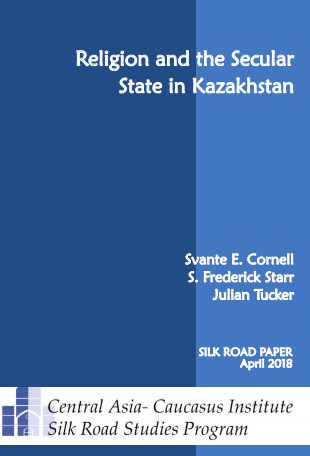 Religion and the Secular State in Kazakhstan
Religion and the Secular State in Kazakhstan
By Svante E. Cornell, S. Frederick Starr and Julian Tucker
April 2018
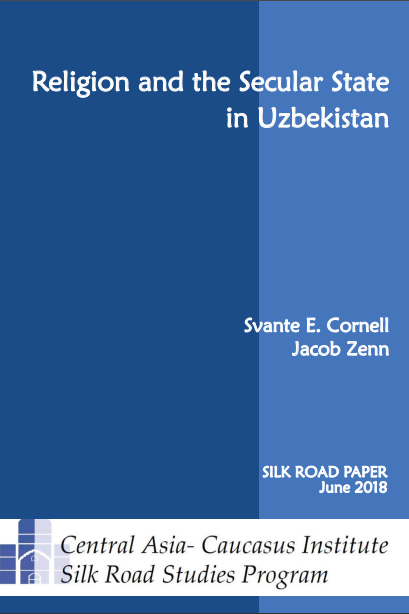 Religion and the Secular State in Uzbekistan
Religion and the Secular State in Uzbekistan
Svante E. Cornell and Jacob Zenn
June 2018
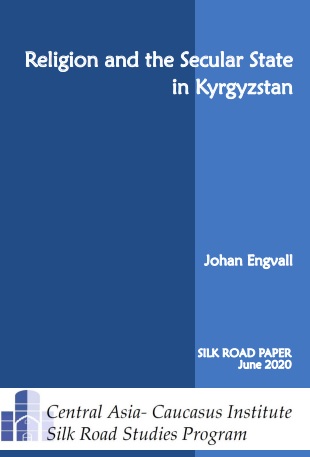 Religion and the Secular State in Kyrgyzstan
Religion and the Secular State in Kyrgyzstan
Johan Engvall
June 2020
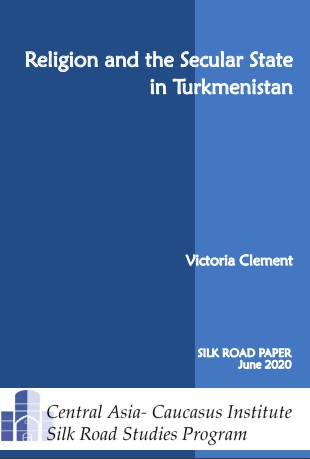 Religion and the Secular State in Turkmenistan
Religion and the Secular State in Turkmenistan
Victoria Clement
June 2020
Articles and Analyses
Svante E. Cornell, "Religion and the State in Central Asia," in Ilan Berman, ed., Wars of Ideas: Theology, Interpretation and Power in the Muslim World, Lanham, MD: Rowman & Littlefield, 2021.
Svante E. Cornell, "Central Asia: Where Did Islamic Radicalization Go?" in Religion, Conflict and Stability in the Former Soviet Union, eds. Katya Migacheva and Bryan Frederick, Arlington, VA: RAND Corporation, 2018.
